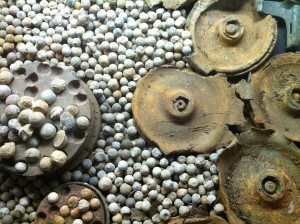Project Researcher Suzie Thomas is going to Belgium this week for a week of research mobility with our colleagues at Vrije Universiteit Brussel (VUB). She will also be spending time in Ieper (Ypres), Ghent and various other parts of Flanders interviewing people about the material legacy of the First and Second World Wars, in order to gather comparative data to our research in Lapland.
On Wednesday 20th April she will give a public lecture at VUB entitled “Lapland’s Dark Heritage: Understanding Encounters with the Material Legacy of the Second World War in Northern Finland”
The abstract for her lecture, which starts at 18:30 at Room E.011 at the VUB Campus, is as follows:
In this presentation I will discuss the growth of research into the concept of ”dark heritage”, which draws from related ideas such as dark tourism, contested heritage and difficult histories. In particular, I will focus on the research project with which I currently work, entitled “Lapland’s Dark Heritage”. This is a collaborative study involving scholars from the Universities of Helsinki and Oulu, and is funded by the Academy of Finland.
“Lapland’s Dark Heritage” seeks to understand, through interdisciplinary approaches, the diverse and sometimes surprising engagements and interactions between people in the present day, and the material culture left by the Second World War in Finnish Lapland. As will be seen, this is arguably a difficult history (a “dark” heritage) – dealing as it does with Finland’s and Nazi Germany’s military cooperation, prisoner of war encampments, mass evacuations, and the destruction of many of Lapland’s settlements and infrastructure during the 1944-45 Lapland War. Yet at the same time, the early 1940s also represented something of an economic boon for the region, and many new people (mostly German soldiers) arrived in the area and formed friendships and relationships with the local population. Consequently, not all perceptions of the era are negative. This leads us to consider the extent to which this is indeed a “dark” heritage, after all.

Shrapnel from WWI, at Flanders Fields Museum, Ypres. Image by Sandra Fauconnier, licensed under the Creative Commons Attribution 4.0 International license.
